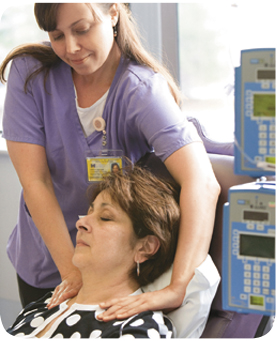Healing Touch
Infusion area massages offered
This service is no longer available at the U-M Rogel Cancer Center

Linda Piacenti reclines in her chair, feet up, a warm blanket covering her polka-dotted sweater. Massage therapist Sarah Lundquist sits at the end of the chair, slowly manipulating Piacenti's leg, from calf to foot.
But Piacenti is not at the spa. She's in the cancer center's infusion area getting chemotherapy for metastatic breast cancer.
"It just makes you feel so relaxed and peaceful," Piacenti said.
Patient & Family Support Services is now offering hand, neck and foot massages in the infusion areas through its Complementary Therapies program. Although therapists make every effort to accommodate requests while they are in the unit, they do not accept appointments. The free massages are provided by therapists specifically trained to work with people with cancer.
The training is important because some forms of deep tissue massages can push extra waste-or lactic acid-out of muscles. For people who aren't on treatment, it might make them feel a little sore. But for people who are already coping with the toxic effects of chemotherapy, that extra bit of waste may be enough to cause flu-like symptoms.
The training also teaches therapists to adjust the pressure they apply and the direction of the massage stroke in areas where lymph nodes have been removed. This is important to ensure that massages do not contribute to lymphedema.
"It's about knowing how to adapt massage to the type of treatment people are receiving," Lundquist said. "It's about understanding how to create less of a demand on the body."
Studies have shown that massage may aid in decreasing anxiety and depression; improving immune function; re-establishing a positive body image; increasing relaxation; improving sleep; providing pain relief; and decreasing fatigue, nausea, diarrhea and loss of appetite.
Cancer care often causes people to feel alienated from their bodies, Lundquist said. Ironically, people often neglect their body's more general needs while they are focusing on treating cancer.
"I've seen people with active lifestyles who would normally deal with stress by going out for a run or a walk, and they're too tired to do that," she said. "They feel almost like their body has failed them. Massage can help you reconnect with that body."
For information on finding a massage therapist in your area, please visit the Society for Oncology Massage website.
Continue reading the Summer, 2008 issue of Thrive.
